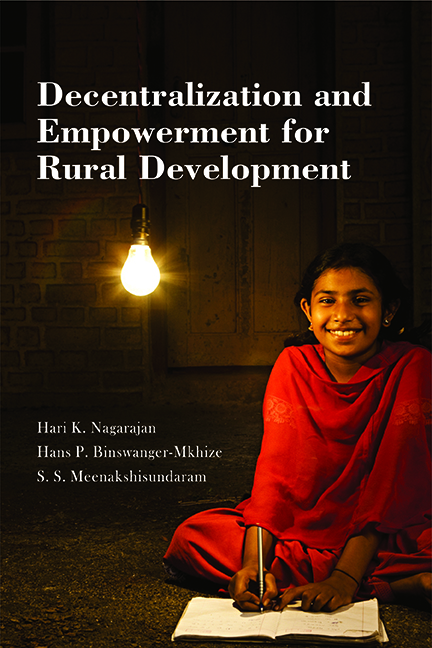Book contents
- Frontmatter
- Contents
- List of Tables and Figures
- Foreword 1
- Foreword 2
- Preface
- 1 Introduction
- 2 Decentralization: Cross-country Experiences
- 3 Thinking about Decentralization in India: 73rd Amendment and Beyond
- 4 Literature
- 5 An Overview of the Data
- 6 Analytical Approaches and Econometric Methods Used
- 7 Can Panchayats Improve the Quality of Services? Some Qualitative Evidence
- 8 Impact of Political Reservations for Women in Panchayats
- 9 Importance of Individual Empowerment of Women
- 10 Governance, Service Provision and Development Outcomes
- 11 The Impact of Fiscal Grants on Tax Efforts of Village Panchayats
- 12 Incidence of Identity-based Voting and Bribes in Panchayats
- 13 Panchayats and Household Vulnerability
- 14 Key Findings, Conclusions and Policy Recommendations
- References
- Index
- About the Authors
9 - Importance of Individual Empowerment of Women
Published online by Cambridge University Press: 30 November 2022
- Frontmatter
- Contents
- List of Tables and Figures
- Foreword 1
- Foreword 2
- Preface
- 1 Introduction
- 2 Decentralization: Cross-country Experiences
- 3 Thinking about Decentralization in India: 73rd Amendment and Beyond
- 4 Literature
- 5 An Overview of the Data
- 6 Analytical Approaches and Econometric Methods Used
- 7 Can Panchayats Improve the Quality of Services? Some Qualitative Evidence
- 8 Impact of Political Reservations for Women in Panchayats
- 9 Importance of Individual Empowerment of Women
- 10 Governance, Service Provision and Development Outcomes
- 11 The Impact of Fiscal Grants on Tax Efforts of Village Panchayats
- 12 Incidence of Identity-based Voting and Bribes in Panchayats
- 13 Panchayats and Household Vulnerability
- 14 Key Findings, Conclusions and Policy Recommendations
- References
- Index
- About the Authors
Summary
‘Every girl will have to part with her share of parental land and hand it over to her brothers. If she has no brother, she will give it to other family members at her parental home. If a woman violates the diktat, she will face social boycott and have to pay a fine.’ A female sarpanch passing a resolution at end of a panchayat meeting in 2012 – the panchayat also declared that even villagers who purchase land from married women would be ostracized.
‘I shall rope in the State's Khap Panchayats, because in many ways they are more powerful in the social sphere than the elected Panchayats.’ – A male sarpanch of a panchayat in Haryana mapping out a strategy for strengthening the role of formal panchayats in promoting literacy of the girl children in villages.
Introduction
In the previous chapter dealt with the impact of political reservations for women in panchayats. This impact is significant and more importantly, appears to be growing over time. There is another way to empower women. It has been shown that women who own assets are significantly empowered within their families and this leads to positive outcomes for both themselves and their family. Of particular interest is to see whether such empowerment gets reinforced by political empowerment.
But, the above quotes reflects wide-ranging prejudices against women owning property, educating the girl children and even panchayats being complicit in reinforcing such behavioural patterns. The relationship between social customs and practices germane to women's ownership of land and being cultivators, and panchayats is often not clear. In India there are often parallel amorphous institutions, panchayats, that regulate the social behaviour – mostly of women. This often includes restrictions on asset ownership, inheritance, education, etc by women.
In addition to political empowerment via reservations discussed in the previous chapter, women can also be empowered by providing them property rights or access to land. It has been shown that such measures significantly affect the life choices made by women (Deininger et al., 2013b). While political reservations lead to avenues for mobilization by women for either economic or political reasons, empowering women by providing access to property alters intra-household dynamics.
- Type
- Chapter
- Information
- Decentralization and Empowerment for Rural Development , pp. 177 - 196Publisher: Foundation BooksPrint publication year: 2014



